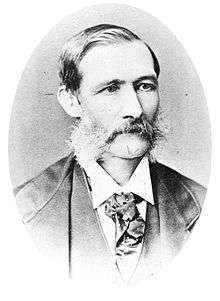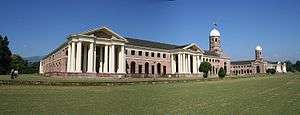Indian Forest Service
 | |
| Service Overview | |
|---|---|
| Preceding service |
Imperial Forest Service (1864 to 1935) |
| Year of Constitution | 1966 |
| Country | India |
| Staff College | Indira Gandhi National Forest Academy (IGNFA), Dehradun |
| Cadre Controlling Authority | Ministry of Environment, Forests and Climate Change |
| Legal personality | Governmental: Government service |
| General nature | Administration of Forest and Wildlife resources |
| Cadre strength | 3131 (2182 Direct Recruits and 949 Promotion Posts) |
| Website |
ifs |
| Service Chief | |
| Director General of Forests | Incumbent: Dr. S.S. Negi, IFS (1980 Batch, Himachal Pradesh Cadre)[1] |
| Head of the All India Civil Services | |
| Current Cabinet Secretary | Pradeep Kumar Sinha, IAS |
Indian Forest Service (Hindi: भारतीय वन सेवा) (abbreviated as IFS[2]) is one of the Civil Services of India and belongs to the All India Services group, with other two All India Services being the Indian Administrative Service (IAS) and the Indian Police Service (IPS).[3][4][5]
Indian Forest Service was created in 1966 under the All India Services Act 1951. Previously, the Imperial Forestry Service existed during the British Raj from 1865 to 1935.
Ministry of Environment, Forest and Climate Change, under the Government of India, is the cadre controlling authority of Indian Forest Service.
History

India was one of the first countries in the world to introduce scientific forest management. In 1864, the British Raj established the Imperial Forest Department. In 1866 Dr Dietrich Brandis, a German forest officer, was appointed Inspector General of Forests. The Imperial Forestry Service was organised subordinate to the Imperial Forest Department in 1867 when five candidates were selected to undergo training in France & Germany. This continued up to 1885 except for a short break on account of war between France and Russia.[6][7]
Officers appointed from 1867 to 1885 were trained in Germany and France, and from 1885 to 1905 at Cooper's Hill, London, also known as Royal Indian Engineering College ( a noted college of Forestry at that time) where 173 officers were trained. From 1905 to 1926, the University of Oxford (Sir William Schlich), University of Cambridge, and University of Edinburgh had undertaken the task of training Imperial Forestry Service officers. In 1920, the Government of India took the historic decision that the IFS Probationers may be trained at one centre and consequent to the establishment of Forest Research Institute at Dehradun, the training started in India in 1926.
The Government of India Act 1935, which transferred forestry to Provisional list, resulted in abolition of the IFS training. With the retirement of IFS officers, the demand for trained foresters cropped up and thus Indian Forest College was born in 1938. The Superior Forest Service officers, recruited from different states, were trained in the Indian Forest College thus retaining the all India character of the service. The main mandate of the service was scientific management of the forests to exploit it on a sustained basis for primarily timber products. It was during this time that large tracts of the forest were brought under state control through the process of reservation under the Indian Forest Act, 1927.
The management of the forest went into the hands of the provincial government in 1935 and even today the Forest Departments are managing the forest of the country under the respective State governments. Since the subject of forestry was shifted to the concurrent list in the year 1977, the central government plays an important role, particularly at the policy level in the management of the forest.
The main thrust of managing forests for production of timber products as in the British period continued even after the reconstitution of IFS in 1966. The recommendations of National Commission on Agriculture in 1976 was a landmark shift in forest management. It was for the first time that people's perception was taken care of in addressing biomass needs and extension activities through social forestry were introduced. The concept of sustained yield was addressed in tandem with biomass needs of the people living in and around forest areas. Equal thrust was given to habitat management in protected area and conserving the biodiversity of the land. Today there are over 2700 IFS officers serving in the country. Besides serving the 31 Forest Departments in the States and Union Territories managing the country's natural resources, a good number of them work in various Ministries and institutions both in the State and Central Government.
Modern agency
The modern Indian Forest Service was established in 1966, after independence, under the All India Services Act 1951. The first Inspector General of Forests, Hari Singh, was instrumental in the development of the IFS.
India has an area of 635,400 km2 designated as forests, about 19.32% of the country. India's forest policy was created in 1894 and revised in 1952 and again in 1988.
Nature of the Service
Officers are recruited via an open competitive examination conducted by the UPSC[8] and then trained for about two years by the Central Government at Indira Gandhi National Forest Academy. Their services are placed under various State cadres and joint cadres, even though they have the mandate to serve both under the State and Central Governments.[9] The main mandate of the service is the implementation of the National Forest Policy which aims to ensure environmental stability and maintenance of ecological balance[10] IFS officers while in field postings in respective state cadres work for conservation, protection and development of forests and wildlife along with an aim to enhance livelihood opportunities of forest dependent communities of rural and tribal areas.
An IFS officer is largely independent of district administration and exercises administrative, judicial and financial powers in their own domain. All top positions in state forest department are held by IFS officers. Positions like Divisional Forest Officer (DFO), Conservator of Forests (CF) and Principal Chief Conservator of Forests (PCCF) etc. are some examples. The highest ranking IFS official in each state is the Head of Forest Forces (HoFF), a cabinet selection post equal in rank to the Chief Secretary for IAS or State Police Chief for the IPS.
They are also eligible for State and Central deputations as their counterpart IAS and IPS officers. Deputation of IFS officers to the Central Government includes appointments in Central Ministries at the position of Deputy Secretary, Director, Joint Secretary and Additional Secretary etc.; appointments in various Public Sector Units, Institutes and Academies at the position of Chief Vigilance Officer (CVO),Regional passport officers,Managing Directors, Inspector General, Director General etc.
Deputation of IFS officers is also permissible to foreign governments, United Nations bodies, international organisations, NGOs, voluntary organisations apart from private sector as per the Indian Forest Service (Cadre) Rules, 1966.[11]
Ranks
| Grade | Union Ministry Designation |
|---|---|
| Apex Scale | Director General of Forests (वन महानिदेशक) |
| HAG+ Scale | Additional Director General of Forests (अपर वन महानिदेशक) |
| Higher Administrative Grade | Inspector General of Forests (वन महानिरीक्षक) |
| PB-4 | Additional Inspector General of Forests (अपर वन महानिरीक्षक) |
| PB-4 | Deputy Inspector General of Forests (उप वन महानिरीक्षक) |
| PB-4 | Director (निदेशक) |
| PB-3 | Assistant Inspector General of Forests (सहायक वन महानिरीक्षक) |
| Grade | State Government Designation |
|---|---|
| Apex Scale | Principal Chief Conservator of Forests (प्रधान मुख्य वन संरक्षक) |
| Above Super Time Scale | Additional Principal Chief Conservator of Forests (अपर प्रधान मुख्य वन संरक्षक) |
| Super Time Scale | Chief Conservator of Forests (मुख्य वन संरक्षक) Regional Chief Conservator of Forests (क्षेत्रीय मुख्य वन संरक्षक) |
| Selection Grade | Conservator of Forests (वन संरक्षक) |
| Junior Administrative Grade
Senior Time Scale |
Deputy Conservator of Forests (उप वन संरक्षक) Divisional Forest Officer (वन प्रमंडल पदाधिकारी) |
| Junior Time Scale | Probationary Officer (प्रशिक्षु पदाधिकारी) |
Equivalent ranks
| S No | Indian Police Service | Indian Forest Service | Indian Administrative Service | Pay scale |
|---|---|---|---|---|
| 1 | Deputy Superintendent of Police | Assistant Conservator of Forests | Sub Divisional Magistrate (States) | 15,600-39,100 plus grade pay of 5400 |
| 2 | Additional Superintendent of Police | Divisional Forest Officer/ Deputy Conservator of Forests | Under/Deputy Secretary to Government of India/Deputy Commissioner/Collector/District Magistrate(states) | 15,600-39,100 plus grade pay of 6600 |
| 3 | Superintendent of Police | Divisional Forest Officer/ Deputy Conservator of Forests (India) | Deputy Secretary to Government of India /Deputy Commissioner/Collector/District Magistrate(states) | 15,600-39,100 plus grade pay of 7600 |
| 4 | Senior Superintendent of Police | Deputy Conservator of Forests (India)/Director of Forestry(Selection Grade) | Director to Government of India/Deputy Commissioner/Collector/District Magistrate(states)(Selection Grade) | 37,400-67,000 plus grade pay of 8700 |
| 5 | Deputy Inspector General of Police | Conservator of Forests | Divisional Commissioner in a Division in states | 37,400-67,000 plus grade pay of 8900 |
| 6 | Inspector General of Police | Chief Conservator of Forests | Joint Secretary to Government of India/Secretary to State Govt. | 37,400-67,000 plus grade pay of 10,000 |
| 7 | Additional Director General of Police | Additional Principal Chief Conservator of Forests | Additional Secretary to Government of India/Principal Secretary to State Govt. | HAG scale of 67,000-79,000 |
| 8 | Director General of Police/Director of Intelligence Bureau | Principal Chief Conservator of Forests | Additional Secretary to Government of India/Additional Chief Secretary to State Govt. | HAG + scale of 75,500–80,000 |
| 9 | No equivalent | Principal Chief Conservator of Forests, Head of Forest Forces (HoFF), Director General of Forests | Secretary to Government of India/Chief Secretary of State | 80,000 (fixed) |
| 10 | No equivalent | No equivalent | Cabinet Secretary | 90,000 (fixed) |
Deputations[12]
As per Rule 6 of the Indian Forest Service (Cadre) Rules, 1966 deputation of IFS officers broadly falls into two categories:[13]
- Central Deputation
- State Deputation
For Central Deputation, there are two schemes devised for the purpose of regulating appointments in Government of India and organisations under its control.
- Central Staffing Scheme
- Non-Central Staffing Scheme
Central Deputation
There are two Central Staffing Schemes, one each controlled by Ministry of Environment and Forests (India) (MoEF) and Department of Personnel & Training (DoPT) of Ministry of Personnel, Public Grievances and Pensions and they are respectively called as CSS of MoEF and CSS of DoPT.
Manning the pre-identified professional positions in the Ministry, its regional offices, subordinate offices, organisations under its control (located elsewhere in the country) and in other Ministries/Departments, exclusively by IFS, CSS of MoEF scheme has been formulated. The posts included under it are Director General of Forests, Additional Director General of Forests, Inspector General of Forests and Deputy Inspector General of Forests in Ministry of Environment and Forests, Associate Professors and Lecturers in IGNFA, Director of Forest Survey of India, Indira Gandhi National Forest Academy, Project Tiger, Project Elephant, National Zoological Park, Forest Education and Deputy Directors/Conservators in Regional offices of the Ministry.
Similar to the CSS of the MoEF, for manning pre-identified positions of Under Secretary (US), Deputy Secretary (DS), Director, Joint Secretary to Government of India (JS), Additional Secretary (AS), Special Secretary (SS) and equivalent levels in the Government of India and its organizations, DoPT have formulated a staffing Scheme. A total of 38 Civil Services including the three All India Services viz IAS, IPS, IFS are participants under this Scheme.
Similar to the CSS, there are two Non-CSSs under the Government of India one each controlled by the MoEF and DoPT. All posts to be filled up by IFS officers in the autonomous bodies under the control of the Ministry viz ICFRE, Dehradun; Wild Life Institute of India, Dehradun and Indian Institute of Forest Management, Bhopal; Wild-Life Crime Control Bureau, Central Pollution Control Board, Central Zoo Authority etc. are called as non-CSS posts. Isolated posts under various Departments and Ministries in Government of India and the posts of Commissions, Autonomous Bodies, Authorities, Trusts, Boards, Societies, etc. constitute non-CSS of DoPT.
State Deputation
An IFS officer may also be deputed for service under a company, association, corporation which is wholly or substantially owned or controlled by a State Government, a Municipal Corporation or Local Body. Appointment is done by the State Government.
Deputation under International Organisation
An IFS officer may also be deputed for service under international organisation by Central Government in consultation with State Government.
Training and Tours[14][15]
IFS officers of the country are part of the nation's management expertise pool. The training course for the IFS Probationers is designed to address these requirements. Some of the essential elements of the training are as follows:
1. Capacity building by imparting technical knowledge and skills required in forestry sector
2. Enhancing management skills
3. The personality development as a member of Indian Forest Service
To achieve the above course objectives, training at the Academy extends over a period of 2 years. Comprehensive exposure to all the subjects that are directly or indirectly related to forestry are provided. The course is designed to be covered in phases as under
1. Foundation Course
2. Professional Phase I
3. Professional Phase II
4. Convocation Phase
Officers of the IFS have to initially attend the common foundation course at Lal Bahadur Shastri National Academy of Administration in Mussorie. On completion of which they are trained at the Indira Gandhi National Forest Academy at Dehradun, with training on forest and wildlife management, soil conservation, surveying, Scheduled Tribes and handling weapons.
After completion of their training the officers are awarded a master's degree in Science (Forestry) of Forest Research Institute. The officers are taught more than 56 subjects of life sciences in these two years.
After completing training at the academy, candidates go through a year of on-the-job field training in the state to which he or she is assigned, during which they are posted as Assistant Conservators of Forests or Deputy Conservator of Forests. After four years of service in the junior scale, which includes a professional training phase and foundation course, officers are appointed to the Senior Time Scale and are entitled to be posted as Deputy Conservators of Forests or Divisional Forest Officers (DFO) in charge of districts/forest divisions.
Tours/Excursions/Exercises[16]
Tours form an integral part of the training; and are arranged so that the Probationers can leam and understand the practice of forestry in its variations in different states of India. The IFS Probationers spend the largest part of their training under tours as compared to all other Civil Services in India. This enables them to understand the scope of their duties and responsibilities as forest officers.
Field excursions are scheduled on Saturdays or any other day in order to supplement the classroom training. Excursions provide an opportunity to familiarize the Probationer with field conditions and assimilate various techniques/skills required in the practice of Natural Resource Management.
The tours are organized to various parts of India as given below:-
- Introductory Tour to Chakrata, Dehradun at an altitude of 2200 m to apprise officers to forest ecosystems
- West India Tour covering Haryana, Rajasthan and Gujarat.
- Hill Tour covering Punjab, Jammu & Kashmir and Himachal Pradesh
- Central & South India Tour covering Madhya Pradesh, Andhra Pradesh, Maharashtra, Karnataka, Tamil Nadu and Kerala.
- East India Tour covering Orissa, West Bengal, Sikkim, Assam, Meghalaya, Bhutan and Andaman and Nicobar Islands.
- Mensuration Exercise at Kanasar, Dehradun
- Road Alignment Exercise
- Working Plan tour to write appropriate plans prescribing treatment of forest crops and socio-economic development of fringe inhabitation
- Watershed Management Tour to formulate an integrated watershed development plan.
- Wildlife Techniques Tour for understanding bio-social dynamics of protected area management and studying parameters of wildlife assessment.
- Excursions on ecosystem dynamics, soil profiles and conservation, geology, biometry, inventory of crops.
- PRA tools testing in fringe area villages and formulating participatory management plans or micro-plans.
- Foreign Tour to learn advancements in the field of forestry at the global level.
Notable IFS officers
- Hari Singh
- Daniel Richmond
- P. Srinivas
- Sanjiv Chaturvedi
- Ramesh K. Pandey
- Hemendra Singh Panwar
- Fateh Singh Rathore
- Kamal Naidu - Shaurya Chakra
See also
- Indian Council of Forestry Research and Education
- Ministry of Environment and Forests, India
- Indian Administrative Service (IAS)
- All India Services
- Van Vigyan Kendra (VVK) Forest Science Centres
References
- ↑ "Dr. S. S. Negi appointed as DG & Special Secretary, MoEF". North Block South Block. Retrieved 2015-12-27.
- ↑ "Official website of Indian Forest Service | National Portal of India". India.gov.in. 2012-08-30. Retrieved 2015-12-27.
- ↑ "Public Service". Official website of Government of India.
- ↑ "rti". Upsc.gov.in. 1997-12-31. Retrieved 2015-12-27.
- ↑ "Indira Gandhi National Forest Academy : Indian Forest Service". Archived from the original on 11 January 2016. Retrieved 27 December 2015.
- ↑ "Indian Forest Service". ifs.nic.in. Retrieved 2016-10-18.
- ↑ Academy, Indira Gandhi National Forest. "Indian Forest Service". www.ignfa.gov.in. Retrieved 2016-10-18.
- ↑ from www.ifs.nic.in Direct Recruits: 66.33 per cent of the cadre strength of the service is filled by Direct Recruitment done through the Union Public Service Commission (UPSC) by conducting an all India level competitive examination open to graduates with science background. After qualifying the written examination, the candidates have to appear for a personality test, a walking test and a standard medical fitness test.
- ↑ "IFS Diaries". Ifsdiaries.blogspot.in. 2015-03-01. Retrieved 2015-12-27.
- ↑ "NFP 1988" (PDF). Envfor.nic.in. Retrieved 2015-12-27.
- ↑ "IFS Cadre MIS - Deputation". Ifs.nic.in. Retrieved 2015-12-27.
- ↑ "Deputation of IFS Officers". ifs.nic.in. Retrieved 2016-10-18.
- ↑ "IFoS Cadre MIS - Central Staffing Scheme". Ifs.nic.in. Retrieved 2015-12-27.
- ↑ "Training of IFS Officers". ignfa.gov.in.
- ↑ "Tours".
- ↑ "Tours".
